 At a Glance
At a GlanceExpert's Rating
Pros
- New colors add newness to a timeless design
- Excellent mix of foreground and background features
- Impressive array of features and sensors
Cons
- Battery life hasn’t improved
- On-demand blood-oxygen readings are finicky
Our Verdict
The Apple Watch Series 6 isn’t a huge upgrade over the Series 5, but it does enough to keep Apple’s wearable firmly in the lead.
Best Prices Today: Apple Watch Series 6
While there are plenty of decent options out there, including Apple’s own SE, the Apple Watch Series 6 is the only real choice when buying a smartwatch. You might not need all of the things it does right now, but if you’re going to spend a few hundred bucks on a smartwatch, it pays to future-proof your wrist.
I’ve been testing quite a few watches and bands recently—the Fitbit Sense, Apple Watch SE, Fossil Carlyle Gen 5, Samsung Galaxy Watch 3, even the Amazon Halo band—and the Apple Watch Series 6 is the undisputed leader of the pack. Yes, you’re paying more for a Series 6 than any of those devices, but the extra money is so well spent you’re better off waiting for a sale to buy one rather than settling for a cheaper watch, even the SE.
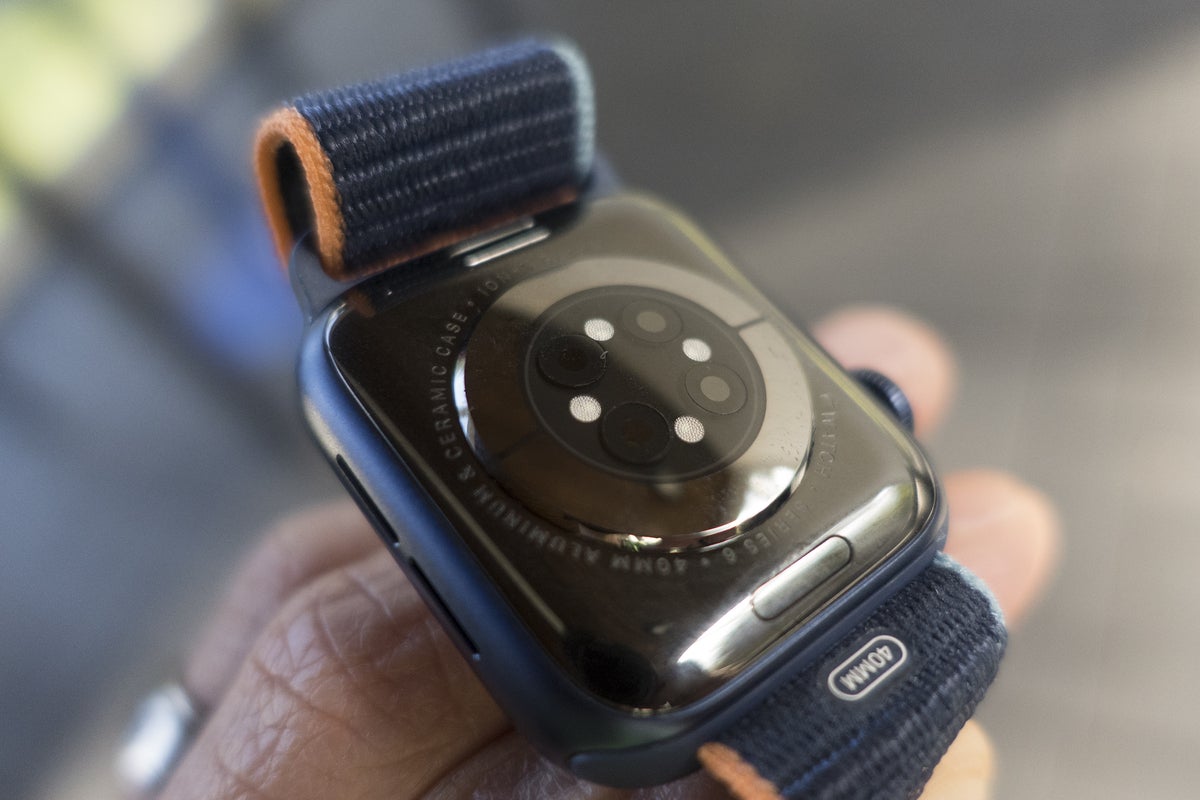 Michael Simon/IDG
Michael Simon/IDGThere are a whole bunch of new sensors on the underside of the Apple Watch Series 6.
That said, the Series 6 isn’t quite perfect. The battery life still can’t match Fitbit’s impressive lengths. Sleep tracking is extremely rudimentary. And the new Sp02 sensor is overly sensitive when taking on-demand readings. But even with those flaws, you’re not going to find another smartwatch that as fast, featured, fashionable, or just plain fun.
A timeless design that still feels fresh
There may come a time when Apple changes the design or even the shape of the Apple Watch, but that’s not the case with the Series 6. It’s basically identical to the Series 5 and not all that different than the original if you happen to be upgrading. Dimensions listed below.
Apple Watch (1st gen) | Apple Watch Series 6 |
|---|---|
| 38mm: 38.6 x 33.3 x 10.5mm | 40mm: 40mm x 34mm x 10.4mm |
42mm: 42.0 x 35.9 x 10.5mm | 44mm: 44mm x 38mm x 10.4mm |
However, Apple’s done just enough to keep it fresh. The new colors are a nice touch and will probably compel more than a few upgrades from Series 4 or 5. The blue color I tested is a lot darker in person than on Apple’s website, but it’s definitely a nice addition to the classic silver, space gray, and gold aluminum. If anything, the new colors illustrate just how little of the Apple Watch’s body is actually visible while wearing it.
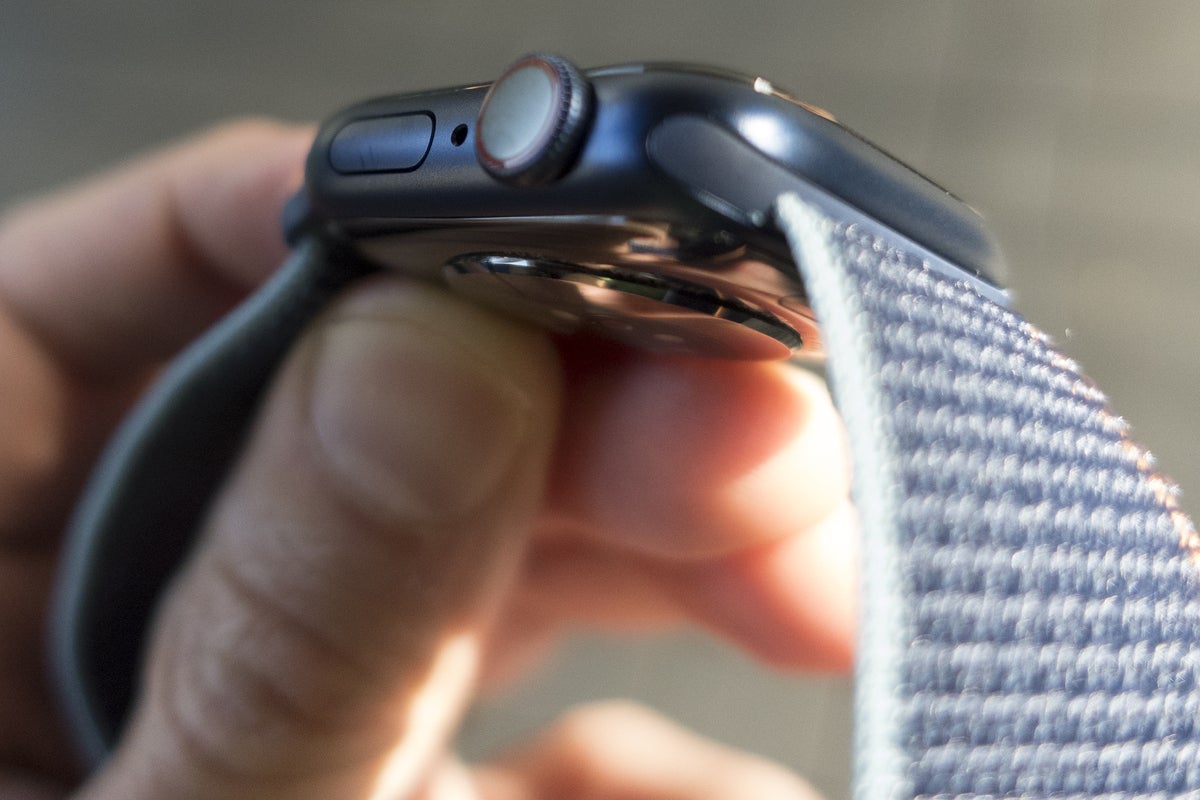 Michael Simon/IDG
Michael Simon/IDGYou’ll need to hold your wrist in just the right light to see how blue the new color is.
No matter which color you choose, however, the Apple Watch’s square shape is ideal for a smartwatch, and there isn’t much about it I’d change other than making it substantially thinner. To be fair, the Series 6 and SE are the thinnest watches Apple has ever made and makes its competitors look positively chunky l, but the profile is still plenty thick compared to a regular wristwatch.
First-gen issues
But there’s a lot going on inside its frame. Along with the ECG sensor, always-on altimeter, and a second-generation optical heart sensor, new to the Series 6 is a blood-oxygen sensor to finally bring it up to speed with Fitbit’s devices. The implementation is a bit different here, but the sensors are very similar, measuring the reflection of red and infrared light to approximate the oxygen saturation in your blood.
In addition to background readings throughout the day, you can also use your Series 6 as a pulse oximeter to get an on-demand reading using the new Blood Oxygen app. It only takes 15 seconds, which is half as long as it takes to get an ECG reading, and in true Apple fashion, the animation during the test is very slick and does well to keep your focus. But the whole process will likely take twice or three times as long since you need to stay incredibly still to get an accurate reading.
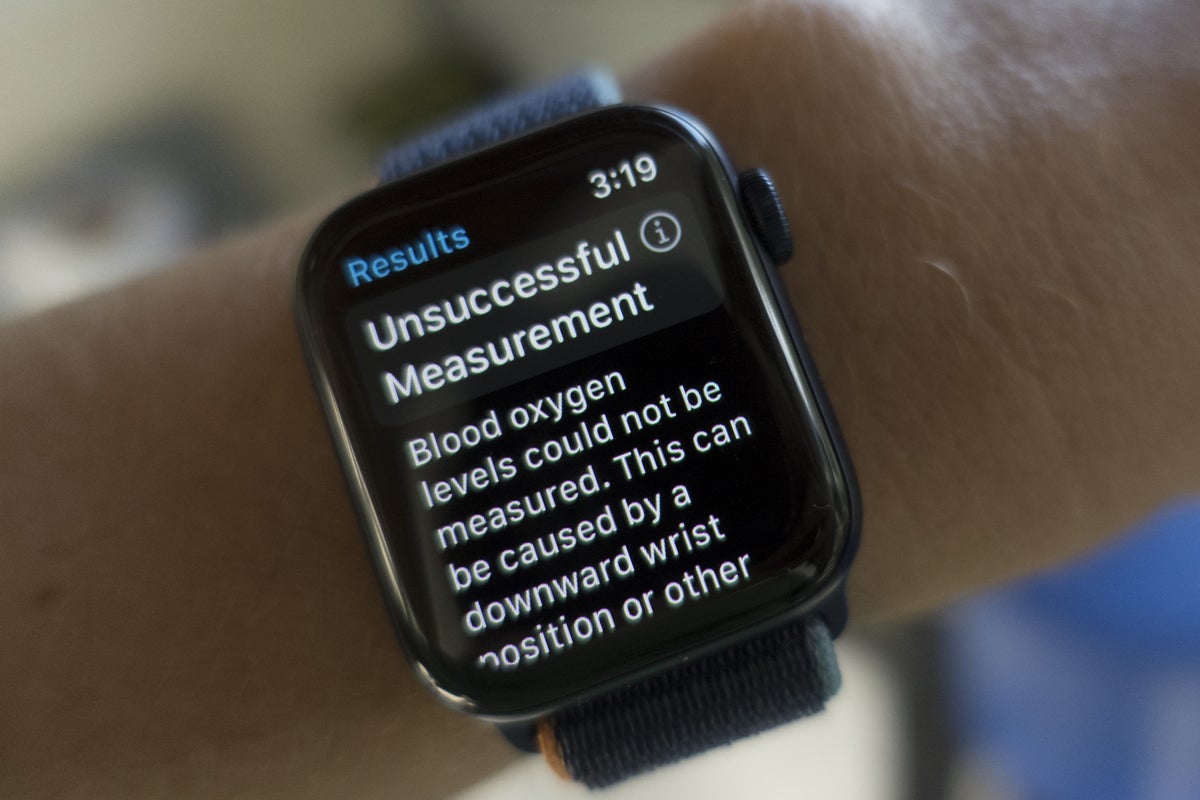 Michael Simon/IDG
Michael Simon/IDGIf you don’t keep perfectly still, you’ll get erroneous blood-oxygen readings.
The app recommends you rest your arm on a table or in your lap, and in my testing even the slightest movement caused dramatic fluctuations in readings. Readings went from 100 percent when resting my arm on a table to as low as 92 percent when simply holding it as still as I could. Background readings were more consistent, but the app doesn’t give much in the way of feedback as to whether the readings are acceptable or alarming.
You can see a chart of your daily readings in the Health app, but it won’t be particularly useful unless you’re a physician or used to using a pulse oximeter. And while you can add a complication to most watch faces, it’s merely a shortcut to the app rather than an updated reading. Apple isn’t even using blood-oxygen to augment its new sleep tracking as Fitbit does.
That will probably improve with watchOS 8, but for now, sleep tracking is extremely basic. Your watch will basically tell you how long you slept with little to no insight into the quality of your slumber. You can see some advanced stats in the Health app but none of it is as straightforward or detailed as Fitbit’s Sleep Stages. It’s both surprising and disappointing that Apple took five years to deliver such rudimentary sleep tracking, but hopefully, it’ll improve without needing to buy a new watch.
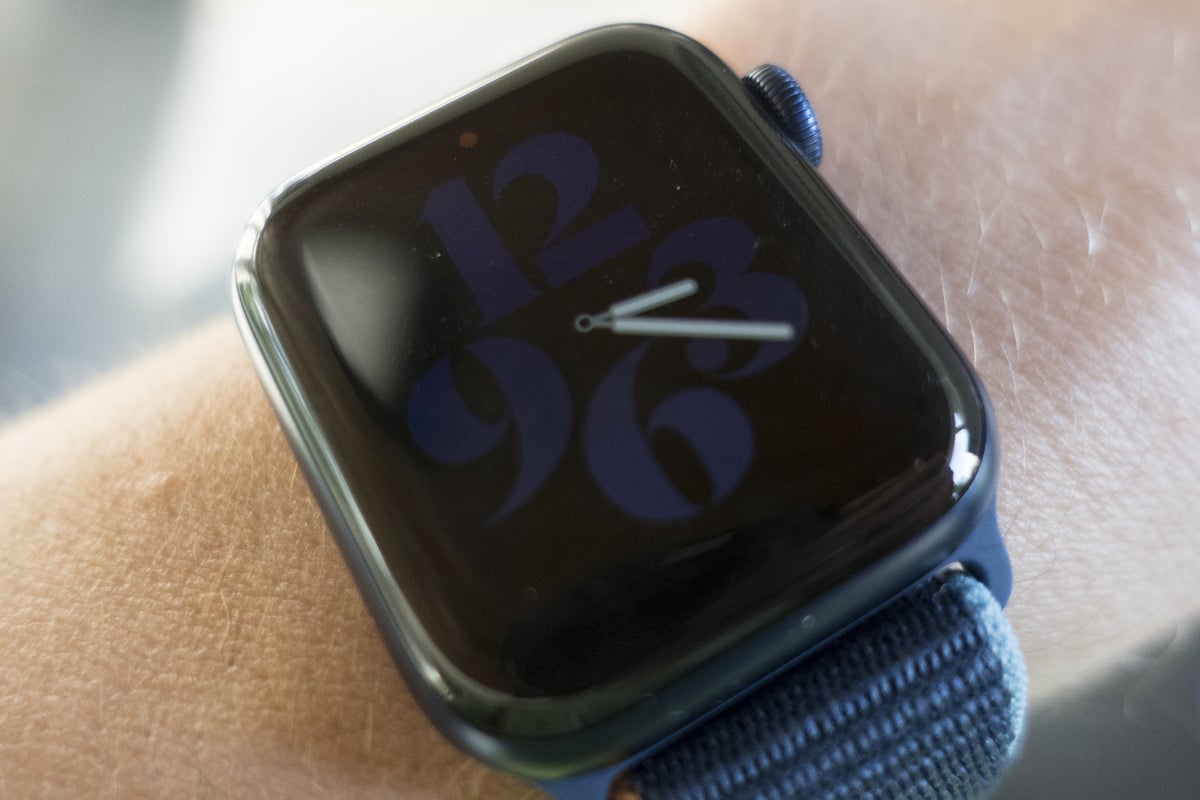 Michael Simon/IDG
Michael Simon/IDGThe always-on display is much more visible in bright light,
What won’t improve with future software updates on the Series 6, at least not in a meaningful way, is battery life. The Series 6 lasts about as long as every Apple Watch that came before, which is to say it’ll get you through most days with moderate use. Apple estimates 18 hours but you’ll probably get a little more than that, even with the always-on display active.
That’s nowhere near the multi-day battery life that Fitbit provides on the Versa and Sense, and it’s easily the Apple Watch’s biggest shortcoming. If you wear it to track sleep, you’ll need to develop a charging routine, and you’ll need to have it off your wrist for about an hour and a half to fill it up. Even though Apple claims the Series 6 charges “faster” than the Series 5, it’s still quite slow and nowhere near Fitbit’s new fast-charging that serves up a day of use in just 12 minutes.
The rest remains the best
As for the umpteen other things the Series 6 can do, it’s simply stellar. If you’re upgrading from an older model, the new watch will feel like a refinement of what you already know. Apps will be faster, Siri will be smarter, heart-rate tracking will be more immediate, and the altimeter will deliver real-time elevation.
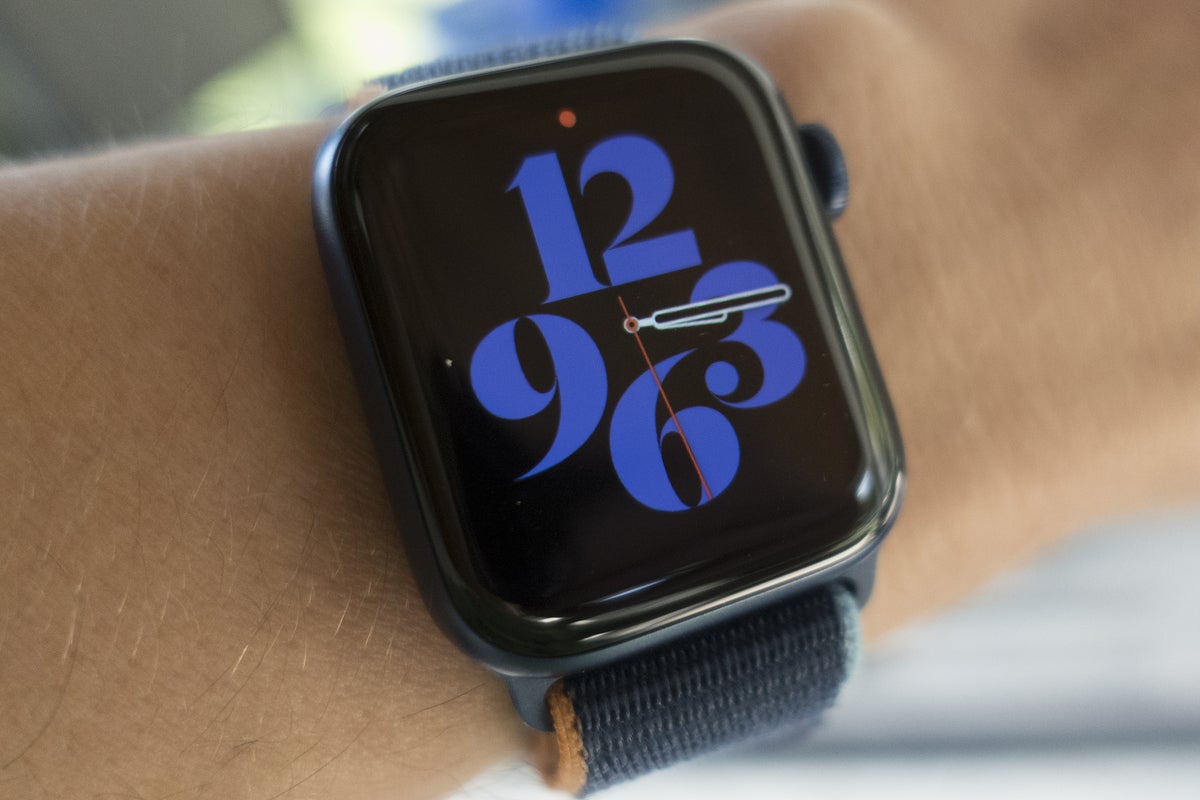 Michael Simon/IDG
Michael Simon/IDGTypography is a simple yet elegant face.
But if you’re coming from a competitor, like the Fitbit Versa or Galaxy Watch, the Apple Watch will feel like a revelation. Apple has developed a system that’s smart and simple while still being powerful and unobtrusive. The speed of the Apple Watch Series 6’s S6 processor might seem unnecessary until you switch to a WearOS watch or Fitbit Versa or even a Series 3 and realize how meaningful each split-second makes when you’re interacting with your wrist.
For example, the Apple Watch’s ECG sensor is pretty remarkable. For one, it’s in a perfect spot on the Digital Crown (versus the edges of the frame on the Fitbit Sense) and it’s not nearly as finicky as the blood-oxygen sensor.
But the best part of the Series 6 is the always-on display. It’s not categorically different than Series 5 so it might not seem like much if you’ve been using a Series 4 watch or earlier, but from both a fashion and a function standpoint, the always-on display makes the Series 6 a worthy upgrade from the SE. It’s brighter than the Series 5, so you won’t struggle to use it outdoors, and it turns the Apple Watch from a piece of tech into a piece of jewelry. Apple’s raise-to-wake gesture is quicker than most other watches, but the always-on display takes the effort out of it.
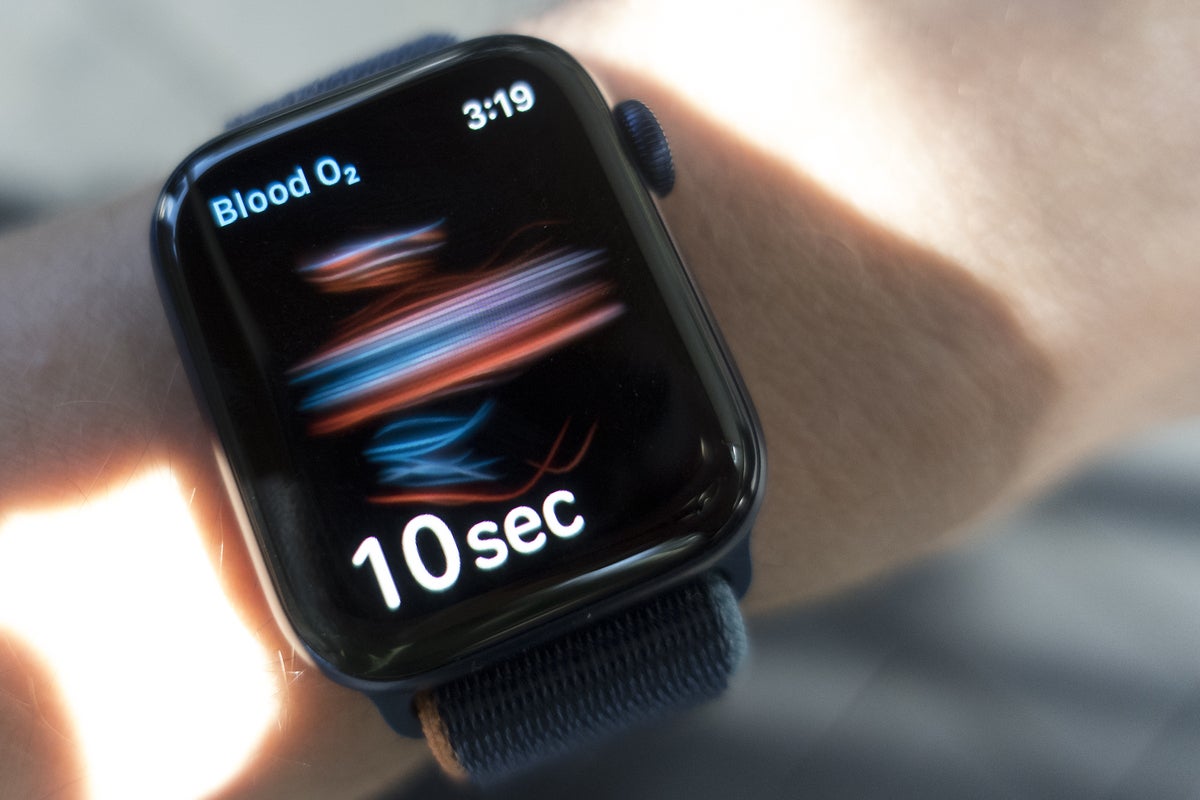 Michael Simon/IDG
Michael Simon/IDGThe blood-oxygen sensor might not be that useful now, but it will be in future watchOS updates.
You can quibble about the lack of third-party watch faces, but based on my experience with Fitbit and WearOS, that might be for the best. Apple has put a tremendous amount of effort into the design of each watch face, and while the newest ones on the Series 6 are quite simple, the Typography and Stripes faces have quickly become part of my rotation. And since Apple has opened up watch face starting and duplicate complications in watchOS 7, developers have more options than ever.
Still, it seems likely that at some point soon Apple will allow for third-party faces with strict UI guidelines like iOS 14’s widgets. The best part of the Apple Watch is how little you need to interact with it, even if your face of choice simply displays the time. From notifications to steps to heart-rate to blood-oxygen and sleep, you can easily go through a whole day without actually touching your Apple Watch. That might seem somewhat counterintuitive for a $399 smart device, but when you strap it on you’ll quickly realize that’s what makes it so valuable.
Should you buy an Apple Watch Series 6?
The Apple Watch Series 6 is no doubt an expensive smartwatch, even if you stick to the cheapest option ($399 for the 40mm aluminum model with a silicone band). But the extra money is worth it. The Series 3 may be half the price, but you’re getting a very slow watch that’s likely to be obsolete within a year, and you’re giving up some important features with the $279 SE, namely ECG, a blood-oxygen sensor, and an always-on display, plus a couple of colors you can only get on the Series 6.
Even for $120 more than the SE, you’re getting a powerful set of features and sensors both for now and years from now. The Apple Watch Series 6 isn’t just Apple’s best smartwatch, it’s the best one you can find anywhere at any price. You’ll be able to get better battery life or sleep tracking with other watches, but those watches can’t really measure up to the dozens of things Apple Watch does so well.


